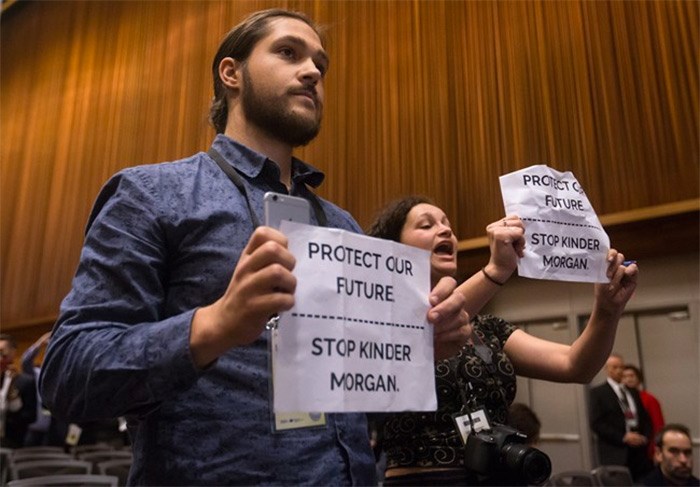 Protesters opposed to the Kinder Morgan Trans Mountain Pipeline expansion interrupt Prime Minister Justin Trudeau’s news conference during the 2017 United Nations Peacekeeping Defence Ministerial conference in Vancouver, B.C., on Wednesday November 15, 2017. THE CANADIAN PRESS/Darryl Dyck
Protesters opposed to the Kinder Morgan Trans Mountain Pipeline expansion interrupt Prime Minister Justin Trudeau’s news conference during the 2017 United Nations Peacekeeping Defence Ministerial conference in Vancouver, B.C., on Wednesday November 15, 2017. THE CANADIAN PRESS/Darryl Dyck
VANCOUVER - Two people protesting Ottawa's approval of the expansion of the Kinder Morgan oil pipeline say they were questioned by police Wednesday after they interrupted a news conference by the prime minister.
Hayley Zacks and 24-year-old Jake Hubley stood with signs protesting the pipeline before telling Prime Minister Justin Trudeau he can't fulfil his climate action promises if projects like Trans Mountain are approved.
Twenty-year-old Zacks said later in an interview that she and Hubley were both first-time voters in the last federal election and they voted for Trudeau because of his election promises.
When the Trans Mountain pipeline was approved, she says they were disappointed.
She says they received passes to the news conference by claiming they were freelance journalists.
Zacks says they were escorted out of the news conference by the prime minister's RCMP security team, handcuffed by Â鶹´«Ã½Ó³»police officers and taken to a nearby station.
After being questioned by police, Zacks says they were released.
The $6.8-billion pipeline expansion project between Edmonton and Burnaby, B.C., would nearly triple the line's capacity and increase tanker traffic sevenfold along British Columbia's southern coast.
![]()


